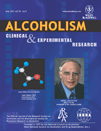Our previous studies showed that ethanol enhanced the activity of adenylyl cyclase (AC) in an isoform-specific manner and that alcohol cutoff point of AC was isoform specific. Recently, we showed that 2,3-butanediol inhibited AC type 7 (AC7) activity in a stereoisomer-specific manner and that this inhibition was also AC isoform specific. These observations strongly suggest that a major target of alcohol action on cAMP signaling is AC. We hypothesized that alcohols exhibit their effect on AC activity by direct interaction with AC proteins. However, experimental systems employed in past studies such as intact cells and membrane preparations are too complex and do not allow us to unequivocally test this hypothesis. In attempt to bypass, these complications of the membrane-bound AC, we decided to study the effect of alcohols on AC recombinant proteins expressed in bacteria.
A recombinant AC, designated as AC7sol, consisting of the C1a and C2 domains of the human AC7 was designed and expressed in bacteria. The activity of AC7sol was examined using lysate prepared from bacteria expressing AC7sol.
The activity of AC7sol was stimulated by manganese or by the α subunit of G protein that stimulates AC (Gsα). Forskolin by itself did not stimulate the activity of AC7sol. However, in the presence of activated Gsα, forskolin stimulated the activity of AC7sol. A series of n-alkanols including ethanol enhanced the manganese-stimulated activity of AC7sol. The alcohol cutoff point of AC7sol was pentanol. Ethanol and butanol increased Vmax and KM values of AC7sol.
These results are consistent with our hypothesis and suggest that the enhancing effect of alcohols on AC activity is because of the increase in turnover number of AC. The current study demonstrates for the first time that the effect of alcohols requires only the C1a and C2 domains of AC and no other domains of AC as well as no other mammalian proteins.
Read Full Abstract
Request Reprint E-Mail: myoshimura@vetmed.lsu.edu
Read Full Abstract
Request Reprint E-Mail: myoshimura@vetmed.lsu.edu
